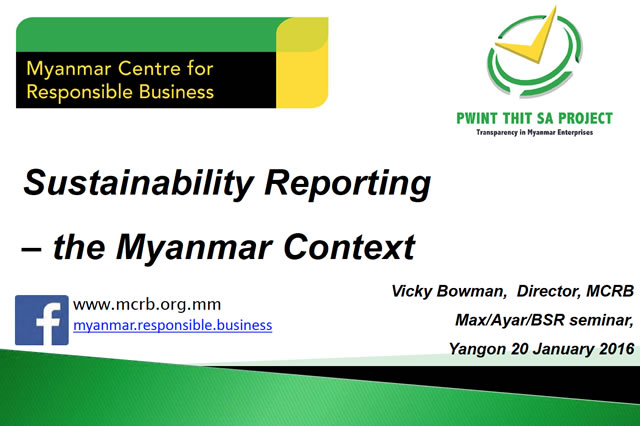Sustainability Reporting Can Build a Social Licence to Operate for Myanmar Businesses

Max Myanmar, Aya Bank and Business for Social Responsibility (BSR) cohosted a seminar at the Novotel on 20 January attended by around 100 local and international company representatives to share international good practice on sustainability reporting and the trends in Myanmar.
Jeremy Prepscius, Partner at BSR, explained how and why companies carry out sustainability reporting and the importance of focussing on information which is of most relevance to both the business and external stakeholders.
Vicky Bowman made a presentation of the outcomes of the 2015 Pwint Thit Sa (Transparency in Myanmar Enterprises) Report and explained plans to launch research for the 2016 report, as well as a voluntary benchmarking service called Mini Pwint Thit Sa which MCRB was offering to medium-sized Myanmar enterprises who would not be included in the 100 biggest companies to be benchmarked in the full 2016 Pwint Thit Sa survey. Smaller Myanmar companies who are interested will have the opportunity to choose whether to have the transparency rating for their website included in MCRB's list.
Vicky also noted that the draft revisions to the Myanmar Companies Act (draft Article 261) which would - if adopted by parliament - contribute to increased business transparency by requiring all Myanmar companies to submit an annual Directors Report which should contain information about the performance of the company and ‘a description of risks and uncertainties facing the company and any other matters which may be prescribed’. It is to be hoped that similar requirements will be introduced for the Yangon Stock Exchange.
A good sustainability report put together following identification of top risks from both management and stakeholder perspective, could be a part of fulfilling this new requirement. Some large Myanmar companies, such as those who have scored highly in the Pwint Thit Sa survey, are already publishing much of the material which is appropriate for a sustainability report, although more focus needs to be placed on reporting on implementation rather than only commitments, such as including data on safety incidents, or numbers of staff trained on anti-corruption codes of conduct, or specific human rights risks, how they have been managed, and lessons learned.
Read also
- 2022 Pwint Thit Sa / Transparency in Myanmar Enterprises
- uab Tops the 2020 Pwint Thit Sa / Transparency In Myanmar Enterprises Ranking
- 2020 Pwint Thit Sa / Transparency in Myanmar Enterprises
- Corporate Disclosure in Myanmar – Regulatory Requirements and Sustainability Leadership
- Disclosure of Company Information Leads to Better Business Reporting and a Better Investment Climate
 English
English မြန်မာ
မြန်မာ မြန်မာ (unicode)
မြန်မာ (unicode)








